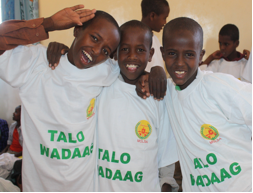
He held a piece of paper to his chest and tried to explain what he had drawn: a painted wall where he used to sit and sniff glue, and a restaurant where he begged for food. “They used to kick us away and pour hot water on us,” said 12-year-old Abdi Omar Yusuf.
Abdi now lives at the Janno Jiif Street Kids & Rehabilitation Center, located on the outskirts of Somaliland’s capital city, Hargeisa. Run by Somaliland’s Ministry of Labor and Social Affairs, the center houses over 100 street children who have been displaced or fled from Somalia and neighboring Ethiopia.
Abdi shared his story during the launch of the Talo Wadaag (‘Sharing Advice’) campaign, a two-day event that emphasized the importance of psychosocial counseling. Dr. Ahmed Hersi, a psychosocial expert embedded within the Ministry of Labor and supported by USAID, led the group.
USAID’s Transition Initiatives for Stabilization (TIS) facilitated a request from the Ministry of Labor to provide a specialist in mental health to improve mental health policy, train social workers and conduct trauma-healing workshops. Bringing experts from the diaspora, such as Dr. Hersi, is one way USAID supports Somali stabilization with the Somali people.
Dr. Hersi guided the children through trauma healing and asked them to draw what life meant to them in their current environment. Stories were shared on imprisonment, physical abuse, abandonment and having to walk hundreds of kilometers in search of safety.
However, each distressing narrative ended in unrelenting ambition. “Many children came here nine months ago,” said Mama Lul, a caretaker of the center. “I tell them Rome was not built in a day. With dedication, they can be whoever they want to be.”
When Abdi finished his presentation, Dr. Hersi asked him what he wanted to be in the future. Smiling, timidly playing with his fingers, he looked up and declared: “A judge… I want to be a judge. Every single child should receive justice.”
USAID’s TIS is implementing over 400 quick-impact projects worth approximately $31 million, in close partnership with Somali local or federal governments, civil society organizations and community members. Somali communities decide what projects will be implemented and supervise progress from bidding to implementation to final evaluations.







Comment
Make a general inquiry or suggest an improvement.